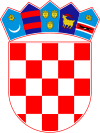
Back تاريخ اليهود في كرواتيا Arabic Židé v Chorvatsku Czech Geschichte der Juden in Kroatien German Ιστορία των Εβραίων στην Κροατία Greek Historia de los judíos en Croacia Spanish تاریخ یهودیان در کرواسی Persian Histoire des Juifs en Croatie French יהדות קרואטיה HE Židovi u Hrvatskoj Croatian Storia degli ebrei in Croazia Italian
 The location of Croatia (dark green) in the European Union (light green) | |
| Total population | |
|---|---|
| 509[1]–2,500[2] | |
| Regions with significant populations | |
| Languages | |
| Hebrew, Ladino, Croatian, and Yiddish | |
| Religion | |
| Judaism | |
| Related ethnic groups | |
| Ashkenazi Jews, Sephardi Jews |
| Part of a series on |
| Jews and Judaism |
|---|
| History of Croatia |
|---|
 |
| Timeline |
|
|
The history of the Jews in Croatia dates back to at least the 3rd century, although little is known of the community until the 10th and 15th centuries. According to the 1931 census, the community numbered 21,505 members, and it is estimated that on the eve of the Second World War the population was around 25,000 people.[4] Most of the population was murdered during the Holocaust that took place on the territory of the Nazi puppet state called the Independent State of Croatia. After the war, half of the survivors chose to settle in Israel, while an estimated 2,500 members continued to live in Croatia.[2] According to the 2011 census, there were 509 Jews living in Croatia, but that number is believed to exclude those born of mixed marriages or those married to non-Jews. More than 80 percent of the Zagreb Jewish Community were thought to fall in those two categories.
Today, Croatia is home to eight synagogues and associated organizations, located in Zagreb, Rijeka, Osijek, Split, Dubrovnik, Čakovec, Daruvar, Slavonski Brod.[5] Of these, the Zagreb community is the largest and most active, organizing events such as the annual Zagreb Jewish Film Festival to promote Jewish culture and identity.
- ^ "Nacionalne manjine u Republici Hrvatskoj" (in Croatian). Government of Croatia. Archived from the original on 13 July 2015. Retrieved 3 January 2020.
- ^ a b "European Jewish Congress -Croatia". Archived from the original on 13 August 2010. Retrieved 28 April 2008.
- ^ American Jewish Year Book. "The Jewish Population of the World (2010)". Jewish Virtual Library. Retrieved 23 July 2011.
- ^ Švob, Melita (2010). Židovska populacija u Hrvatskoj i Zagrebu. Zagreb: Židovska općina Zagreb, Istraživački i dokumentacijski centar CENDO. p. 8. ISBN 978-9536800124. Retrieved 26 June 2022.
- ^ "The Jewish guide to Croatia". LikeCroatia. Retrieved 1 May 2016.